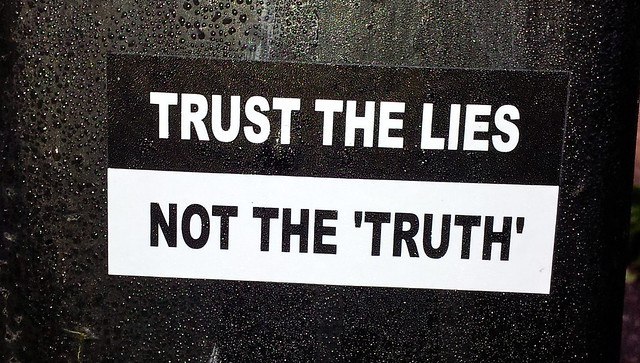Terms like "post-truth politics" and "post-truth era" are being thrown around a lot lately. With what we have seen from President-elect Trump so far, they seem likely to become a part of our language for some time. As we hear references to "post-truth," we should understand what they mean, where they first took hold, and why they are particularly important for those of us who are working to promote reason, critical thinking, skepticism, and freethought.
Oxford Dictionaries recently defined post-truth as "relating to or denoting circumstances in which objective facts are less influential in shaping public opinion than appeals to emotion and personal belief," and CBS News notes that popular use of a similar term, "truthiness," is often credited to Stephen Colbert. Colbert popularized the term during the administration of George W. Bush even though the common ideas behind "post-truth" and "truthiness" appear to extend back long before Colbert.
My awareness of the "post-truth" phenomenon began in 2004 with Ron Suskind's widely reported article in The New York Times Magazine in which he quoted an unnamed Bush aid (some would later attribute this to Karl Rove) as follows:
The aide said that guys like me were "in what we call the reality-based community," which he defined as people who "believe that solutions emerge from your judicious study of discernible reality." ... "That's not the way the world really works anymore," he continued. "We're an empire now, and when we act, we create our own reality. And while you're studying that reality—judiciously, as you will—we'll act again, creating other new realities, which you can study too, and that's how things will sort out. We're history's actors…and you, all of you, will be left to just study what we do."
In essence, the idea was that there were at least two realities. There was the objective reality which most of us attempt to inhabit to the best of our ability, the reality where facts matter. And then there was the created "reality" where facts are far less important than what people can be persuaded of using appeals to emotion and the skillful sort of propaganda one found on Fox News and conservative talk radio in 2004.
If the post-truth political and media framework was up and running during 2004, I think it is safe to say that today's version has developed far beyond what could have been imagined in 2004. The incoming Trump administration appears to be taking it to new levels. There is a boldness about it now unlike what we saw during the Bush administration. President-elect Trump openly lies to the American people even when it is simple to prove that he is lying. For example, he might make a clear public statement that is recorded on video and widely distributed, wait until we have all seen it, and then deny ever making it. Anyone can go to the video and see for themselves that he did in fact make the statement he now denies. And yet, this seems to matter little. He does appear to be creating his own reality, a false reality with which a disturbing number of Americans seem inclined to go along.
Many people are scared about the incoming Trump administration for many different valid reasons. One of my primary fears concerns this whole post-truth thing and how ineffective our normal safeguards have been at opposing it. Even when it is proven that Trump is repeatedly lying, it does not seem to matter. Facts have taken a back seat to how Trump makes people feel; if he makes them feel good, they don't particularly care that he is lying to them.
In a lengthy but must-read article, former Politico editor, Susan B. Glasser, wrote:
Because the media scandal of 2016 isn’t so much about what reporters failed to tell the American public; it’s about what they did report on, and the fact that it didn’t seem to matter. Stories that would have killed any other politician—truly worrisome revelations about everything from the federal taxes Trump dodged to the charitable donations he lied about, the women he insulted and allegedly assaulted, and the mob ties that have long dogged him—did not stop Trump from thriving in this election year. Even fact-checking perhaps the most untruthful candidate of our lifetime didn’t work; the more news outlets did it, the less the facts resonated.
What scares me is that all the things we associate with reality (e.g., fact-checking, skepticism, critical thinking, secular education, freethought, reason) are going to take a real hit during the next 4-8 years. And when these things erode, we all know what tends to flourish in their place. This is not the only thing that concerns me about a Trump administration, but it is a big one.
Back to Glasser's article:
The election of 2016 showed us that Americans are increasingly choosing to live in a cloud of like-minded spin, surrounded by the partisan political hackery and fake news that poisons their Facebook feeds. Nature, not to mention Donald Trump, abhors a vacuum.
We have been hard at work over the last several years constructing our echo chambers. We have learned how to effectively utilize social media to shape our realities in such a way that we are surrounded by like-minded people and have increasingly limited our exposure to views that may be different from our own. We have collectively turned our backs on objective reality, and I fear that we are about to face some difficult reminders about why this is so detrimental.
